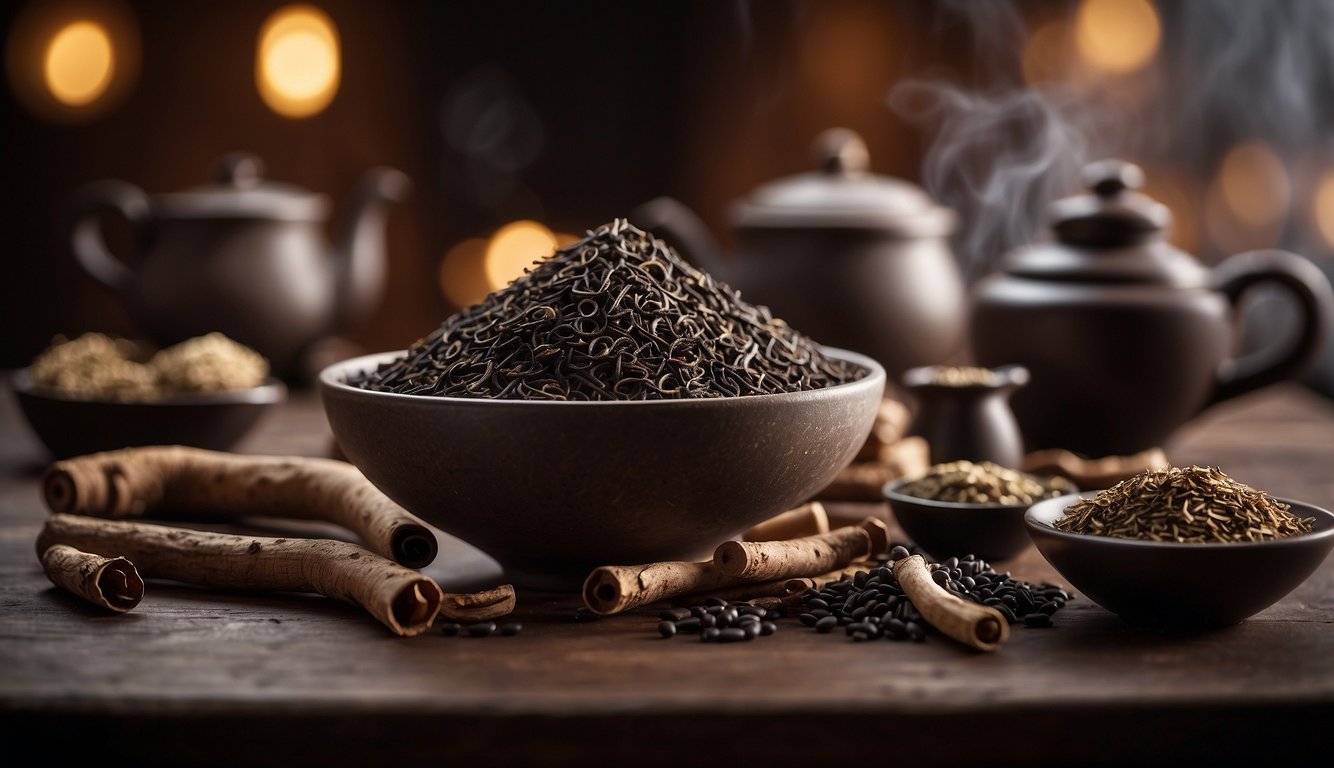TheHerbProf.com is a treasure trove of knowledge for those interested in natural healing and herbal remedies. The website is run by Paul Johnston MD. A naturopathic who has not only received extensive education in the field but also has personal experience in self-healing.
Licorice root, also known as Glycyrrhiza glabra, has been used for centuries in traditional medicine to treat a variety of ailments. It is a natural sweetener that is commonly used in candy, beverages, and medicine. However, licorice root has many more benefits than just its sweet taste.
One of the most well-known benefits of licorice root is its ability to soothe digestive issues. It has been shown to help with acid reflux, indigestion, and peptic ulcers. Licorice root also has anti-inflammatory properties that can help reduce inflammation in the digestive tract. Additionally, it has been used to treat oral mucositis, a common side effect of cancer treatments that causes painful sores in the mouth.
Research has also shown that licorice root has antioxidant and antimicrobial properties. These properties make it a potential treatment for skin conditions such as eczema and acne. It has also been shown to have a positive effect on the immune system, making it a potential treatment for autoimmune diseases. Overall, licorice root is a versatile herb with many potential health benefits.
Historical Use and Origin

Licorice root, scientifically known as Glycyrrhiza glabra, has been used for centuries for its medicinal properties. The root is native to Asia, specifically the Mediterranean and Middle East regions, and has been used in Traditional Chinese Medicine for over 5,000 years [1].
Traditional Chinese Medicine
In Traditional Chinese Medicine, licorice root is known as “gan cao” and is believed to have a sweet flavor and a neutral nature [2]. It is commonly used as a harmonizing herb to balance the effects of other herbs in a formula. It is also believed to have a calming effect on the body and is often used to soothe coughs and sore throats.
Licorice in Western Medicine
Licorice root has also been used in Western medicine for its medicinal properties. In ancient Greece, it was used to treat coughs, colds, and other respiratory ailments [3]. In modern times, it is still used to treat respiratory conditions, as well as digestive issues such as acid reflux, upset stomach, and heartburn [4].
Also, in addition to its medicinal properties, licorice root is also used as a flavoring agent in many food and beverage products, including candies, teas, and chewing gum.
Overall, licorice root has a long history of use in both Traditional Chinese Medicine and Western medicine, and continues to be used today for its various health benefits.
References:
- https://www.sciencedirect.com/science/article/pii/S037887412200633X
- https://www.ncbi.nlm.nih.gov/pmc/articles/PMC7167888/
- https://www.sciencedirect.com/science/article/pii/S0378874113008914
- https://www.healthline.com/nutrition/licorice-root
Active Compounds in Licorice Root
Licorice root is a plant that has been used for medicinal purposes for centuries. It contains several active compounds that are responsible for its health benefits.
Glycyrrhizin and Flavonoids
One of the most important compounds in licorice root is glycyrrhizin. It is a sweet-tasting compound that has been shown to have anti-inflammatory, antiviral, and antimicrobial properties. Glycyrrhizin has also been shown to have a positive effect on the immune system, helping the body to fight off infections and diseases.
Licorice root also contains several flavonoids, which are plant compounds that have antioxidant properties. These include liquiritin, isoliquiritin, and glabridin. Flavonoids have been shown to have a positive effect on heart health, reducing the risk of heart disease and stroke.
Other Phytochemicals
In addition to glycyrrhizin and flavonoids, licorice root contains several other phytochemicals that have been shown to have health benefits. These include:
- Glycyrrhetinic acid: This compound has been shown to have anti-inflammatory and anti-cancer properties.
- Licochalcone A: This compound has been shown to have antimicrobial and anti-inflammatory properties.
- Licoricidin: This compound has been shown to have antimicrobial and anti-inflammatory properties.
Licorice root also contains several other compounds, including coumarins, triterpenoids, and saponins. While these compounds have not been studied as extensively as glycyrrhizin and flavonoids, they may also have health benefits.
Licorice root contains several active compounds that have been shown to have health benefits. These compounds include glycyrrhizin, flavonoids, and other phytochemicals such as glycyrrhetinic acid, licochalcone A, and licoricidin. While more research is needed to fully understand the health benefits of licorice root, it is clear that it has the potential to be a valuable addition to a healthy diet.
Health Benefits of Licorice Root

Licorice root has been used for centuries in traditional medicine to treat a variety of ailments. It contains several compounds that have been shown to have health benefits, including anti-inflammatory, antioxidant, and antimicrobial properties. In this section, I will discuss some of the health benefits of licorice root, including its ability to support the digestive system, provide respiratory relief, enhance the immune system, and improve skin health.
Digestive System Support
Licorice root has been traditionally used to treat digestive issues such as ulcers and indigestion. According to a study published in the Journal of Clinical Gastroenterology, licorice root extract can help to reduce inflammation in the digestive tract and may be effective in treating peptic ulcers caused by Helicobacter pylori infections. Licorice root has also been shown to have a soothing effect on the stomach and can help to relieve symptoms of acid reflux, upset stomach, and heartburn.
Respiratory Relief
Licorice root has been used for centuries to treat respiratory issues such as coughs and sore throats. According to a study published in the Journal of Alternative and Complementary Medicine, licorice root can help to relieve coughs by acting as an expectorant, which helps to loosen and expel mucus from the respiratory tract. Licorice root can also help to soothe sore throats by reducing inflammation and irritation in the throat.
Immune System Enhancement
Licorice root has been shown to have immune-enhancing properties. According to a study published in the Journal of Immunotoxicology, licorice root extract can help to stimulate the immune system by increasing the production of antibodies and enhancing the activity of immune cells. Licorice root has also been shown to have antimicrobial properties, which can help to protect against infections.
Skin Health Improvement
Licorice root has been used for centuries to treat a variety of skin conditions, including eczema and psoriasis. According to a study published in the Journal of Drugs in Dermatology, licorice root extract can help to reduce inflammation and irritation in the skin, which can help to improve the symptoms of these conditions. Licorice root has also been shown to have antioxidant properties. Which can help to protect the skin from damage caused by free radicals.
Licorice Root Forms and Uses

Licorice root is a versatile herb that comes in many forms, each with its own unique benefits and uses. Here are some of the most common forms of licorice root and how they can be used:
Teas and Beverages
One popular way to consume licorice root is through tea and other beverages. Licorice root tea can be made by steeping licorice root in hot water for several minutes, then straining out the root and drinking the resulting liquid. Licorice root tea is known for its sweet, slightly spicy flavor and is often used as a natural remedy for coughs, sore throats, and other respiratory issues.
In addition to tea, licorice root is also used in other beverages such as licorice root beer and licorice root kombucha. These beverages offer a tasty and refreshing way to enjoy the benefits of licorice root.
Supplements and Extracts
Licorice root is also available in supplement and extract form, which can be taken orally for a variety of health benefits. Licorice root supplements are typically available in capsule or powder form and can be found at most health food stores.
It can be taken orally or applied topically to the skin for a variety of purposes, including reducing inflammation and promoting healing. Licorice root extract is a concentrated form of the herb that is often used in herbal medicine.
Topical Applications
Licorice root can also be used topically to treat a variety of skin conditions. Licorice root extract is often used in skin care products for its anti-inflammatory and antioxidant properties. It can help to soothe irritated skin, reduce redness, and promote healing.
Licorice root can also be found in lozenge form, which can be used to soothe sore throats and coughs. These lozenges are typically made with natural ingredients and can be found at most health food stores.
Overall, licorice root is a versatile herb with many forms and uses. Whether you prefer to drink it in tea form, take it as a supplement, or apply it topically, licorice root can offer a variety of health benefits.
Potential Side Effects and Precautions
As with any supplement or medication, licorice root may cause side effects or interact with other substances. It is important to understand these potential risks before taking licorice root.
Effects on Blood Pressure and Potassium Levels
Licorice root can cause an increase in blood pressure and a decrease in potassium levels in some people. This is due to the glycyrrhizin content in licorice root, which can cause the body to retain sodium and lose potassium. If you have high blood pressure or low potassium levels, it is important to speak with your doctor before taking licorice root.
Considerations for Pregnant Women
Pregnant women should avoid taking licorice root, as it may increase the risk of premature delivery or miscarriage. Licorice root may also cause the baby to be born with low birth weight or developmental issues. If you are pregnant or breastfeeding, it is important to speak with your doctor before taking any supplements.
Interactions with Medications
Licorice root may interact with certain medications, including blood pressure medication, diuretics, and corticosteroids. It can also increase the effects of medications that are broken down by the liver. If you are taking any medications, it is important to speak with your doctor before taking licorice root.
It is important to follow the recommended dosage of licorice root, as taking too much can cause side effects. The recommended dosage varies depending on the form of licorice root and the reason for taking it. It is important to speak with your doctor or a qualified healthcare provider to determine the appropriate dosage for your needs.
While licorice root has many potential health benefits, it is important to be aware of the potential side effects and interactions with other substances. If you have any concerns about taking licorice root, it is important to speak with your doctor or a qualified healthcare provider.
Research and Studies

Licorice root has been the subject of numerous research studies to explore its potential health benefits. These studies include clinical trials and laboratory research.
Clinical Trials
Several clinical trials have been conducted to investigate the effects of licorice root on various health conditions. A study published in the Journal of Alternative and Complementary Medicine found that licorice root may have beneficial effects on patients with functional dyspepsia, a common digestive disorder. The study showed that licorice root extract improved symptoms such as bloating, nausea, and early satiety.
Another clinical trial published in the Journal of Medicinal Food found that licorice root extract may help reduce inflammation in patients with osteoarthritis. The study showed that patients who took a licorice root supplement experienced a significant reduction in pain and stiffness compared to a placebo group.
Laboratory Research
Laboratory research has also been conducted to investigate the potential mechanisms behind the health benefits of licorice root. A study published in the journal Molecules found that licorice root extract may have anti-inflammatory and antioxidant properties. The study showed that the extract was able to reduce the production of inflammatory cytokines and increase the activity of antioxidant enzymes.
Another laboratory study published in the Journal of Ethnopharmacology found that licorice root extract may have potential anti-cancer properties. The study showed that the extract was able to induce apoptosis, or programmed cell death, in cancer cells.
Overall, these studies suggest that licorice root may have potential health benefits, although more research is needed to confirm these findings. It is important to note that licorice root can also have potential adverse effects, particularly in high doses or with prolonged use, as noted by a comprehensive review on its phytochemistry, biological activities, clinical evidence and toxicology published in PubMed Central.
Regulatory Status and Recommendations
FDA Guidelines
The Food and Drug Administration (FDA) recognizes licorice root as a safe food ingredient, but they have issued guidelines for its safe consumption. According to CFR Title 21, Part 184, Subpart B, Section 184.1408, licorice root and its derivatives are generally recognized as safe (GRAS) when used in food at levels not to exceed 3.1% by weight of the finished food product. The guidelines also state that ammoniated glycyrrhizin, a derivative of licorice root, is safe for use in food at levels not to exceed 0.1% by weight of the finished food product.
Safe Consumption Practices
Despite the FDA’s recognition of licorice root as a safe food ingredient, it is important to consume it in moderation. Excessive consumption of licorice root can lead to adverse health effects, including high blood pressure, low potassium levels, and fluid retention. Therefore, it is recommended that individuals consume no more than 30-50 grams of licorice candy per day, which is equivalent to about 100-200 milligrams of glycyrrhizin per day.
It is also important to note that licorice root may interact with certain medications, such as blood thinners, diuretics, and corticosteroids. Therefore, individuals taking these medications should consult with their healthcare provider before consuming licorice root.
While licorice root is generally recognized as safe by the FDA, it is important to consume it in moderation and follow safe consumption practices. Individuals should also be aware of potential interactions with certain medications and consult with their healthcare provider before consuming licorice root.
Before You Go – Licorice Root Benefits

Licorice root has been used for centuries in traditional medicine to treat a variety of ailments. Modern research has confirmed many of its benefits and potential health benefits.
Studies have shown that licorice root extract can help relieve symptoms of indigestion, such as acid reflux, upset stomach, and heartburn. It may also benefit liver health, digestion/gut health, dental health, weight management, and skin health.
Licorice root contains bioactive compounds such as glycyrrhizin, glabridin, licochalcone A, licoricidin, and licorisoflavan A, which are responsible for its various health benefits.
It is important to note that licorice root should be consumed in moderation and under the guidance of a healthcare professional, as excessive consumption can lead to side effects such as high blood pressure, low potassium levels, and hormonal imbalances.
Overall, licorice root is a promising natural remedy with potential health benefits, but further research is needed to fully understand its effects on the body.
Licorice Root Benefits to TheHerbProf.com
Licorice is a sweet herb with a multitude of health benefits, and at TheHerbProf.com, we’re all about exploring these benefits! Here’s how our website and this subject harmonize:
- Licorice Lore: We provide comprehensive information about licorice, its medicinal properties, and its uses in herbal medicine.
- Herbal Highlights: Our site offers insights into how licorice can be incorporated into your herbal regimen.
- Culinary Creations: We share delicious recipes that showcase the versatility of licorice in cooking.
- Health and Wellness: Our focus is on promoting overall health and wellness, and licorice plays a crucial role in this.
- Community Connection: Connect with others who are passionate about licorice and share your experiences.
So, whether you’re a licorice enthusiast or just starting your herbal journey, TheHerbProf.com is your trusted guide. Remember, stay curious and stay healthy!
References:
Little Herb Encyclopedia, by Jack Ritchason; N.D., Woodland Publishing Incorporated, 1995
The Ultimate Healing System, Course Manual, Copyright 1985, Don Lepore
Planetary Herbology, Michael Tierra, C.A., N.D., Lotus Press, 1988
Handbook of Medicinal Herbs, by James A. Duke, Pub. CRP Second Edition 2007
The Complete Medicinal Herbal, by Penelope Ody, Published by Dorling Kindersley
Before You Go – Check the Following Articles!
Frequently Asked Questions – Licorice Root Benefits
What are the skin care advantages of using licorice root?
Licorice root has anti-inflammatory properties that can help soothe irritated skin and reduce redness. It also contains antioxidants that protect the skin from environmental stressors, such as pollution and UV rays. Licorice root extract is often used in skin care products to help brighten skin and even out skin tone. It can also help reduce the appearance of dark spots and hyperpigmentation.
How does licorice root support women’s health?
Licorice root has been traditionally used to support women’s health. It contains compounds that can help regulate hormones and alleviate symptoms of PMS and menopause. Licorice root can also help reduce inflammation and support the immune system, which can be especially beneficial for women’s health. However, it is important to note that licorice root should not be consumed in large amounts during pregnancy as it may increase the risk of premature labor.
In what ways does licorice root aid in digestive health?
Licorice root has been used for centuries to aid in digestive health. It contains compounds that can help soothe inflammation in the digestive tract and reduce symptoms of indigestion, such as acid reflux, upset stomach, and heartburn. Licorice root can also help support healthy gut bacteria and improve overall digestive function. However, it is important to note that consuming too much licorice root can lead to negative side effects, such as low potassium levels.
Can licorice root improve hair condition?
Licorice root has been shown to have potential benefits for hair health. It contains compounds that can help soothe the scalp and reduce inflammation, which can improve hair growth and reduce dandruff. Licorice root extract is often used in hair care products to help strengthen hair and reduce hair loss. However, more research is needed to fully understand the effects of licorice root on hair health.
What are the potential side effects of consuming licorice root?
Consuming too much licorice root can lead to negative side effects, such as low potassium levels, high blood pressure, and fluid retention. It can also interact with certain medications, such as diuretics and blood thinners. It is important to consume licorice root in moderation and talk to a healthcare provider before taking any supplements or medications containing licorice root.
How does licorice root interact with certain medications?
Licorice root can interact with certain medications, such as diuretics, blood thinners, and corticosteroids. It can also affect the absorption and metabolism of other medications. It is important to talk to a healthcare provider before taking any supplements or medications containing licorice root, especially if you are taking other medications.


